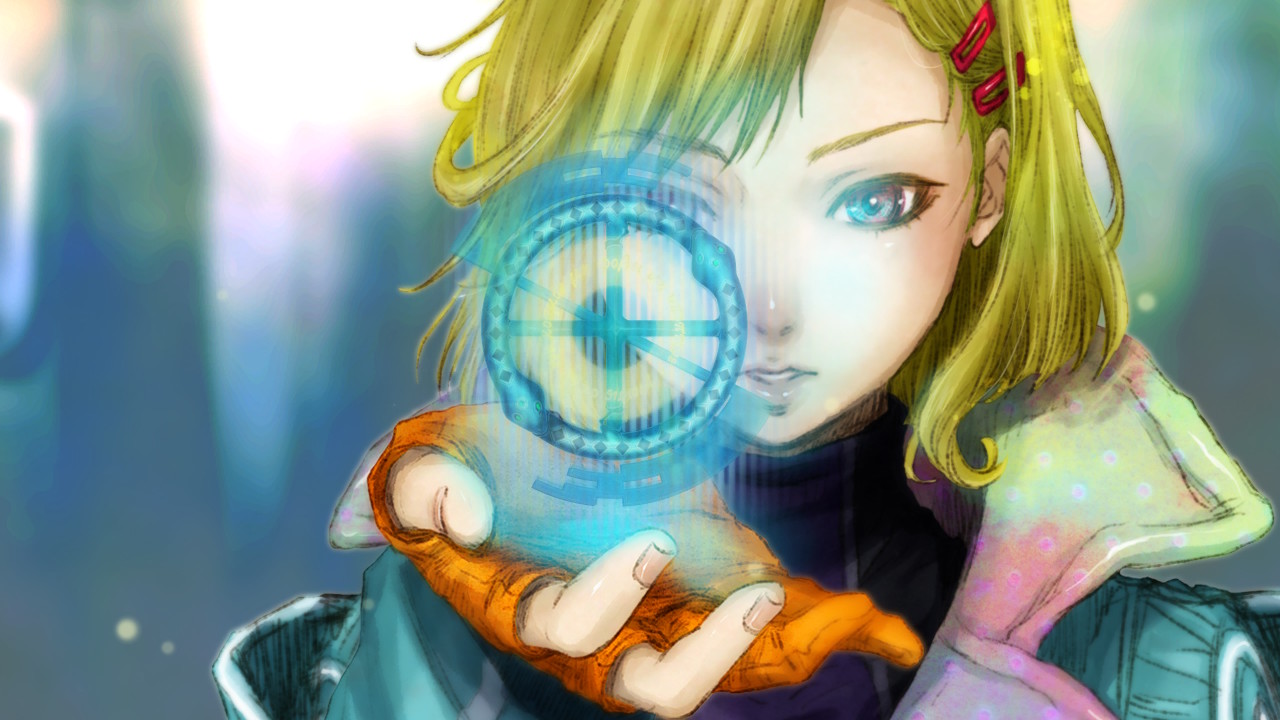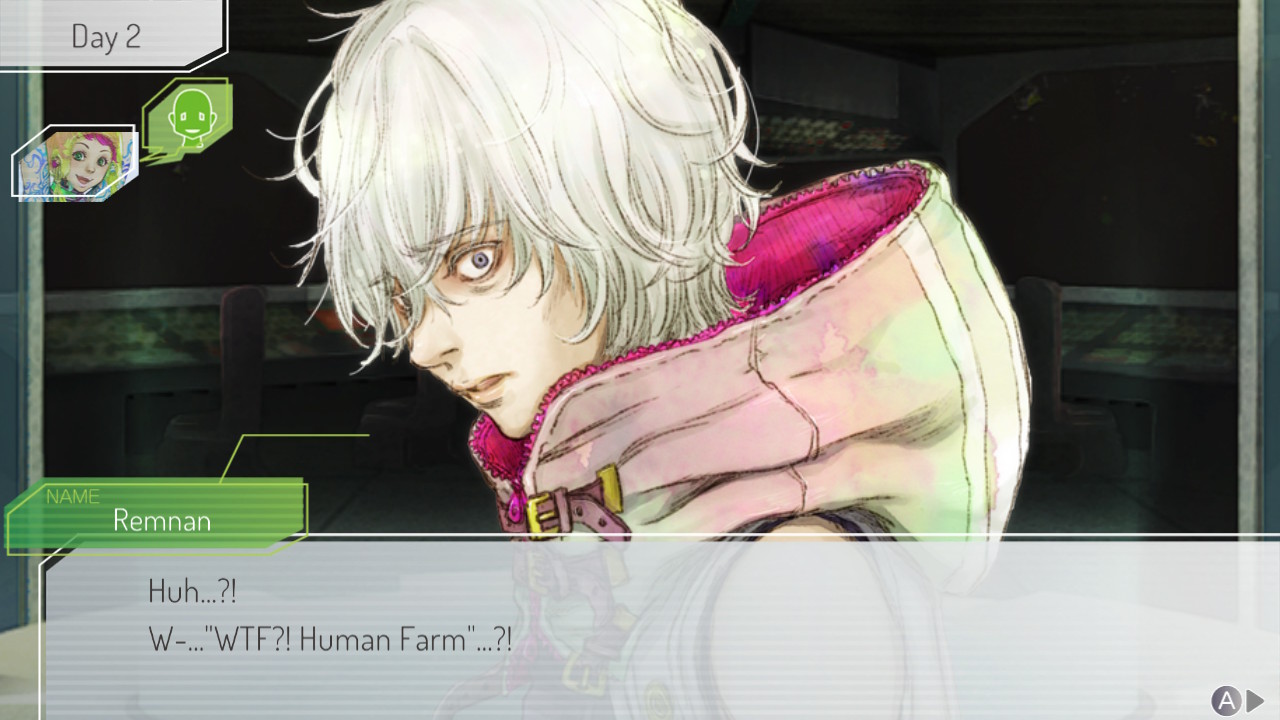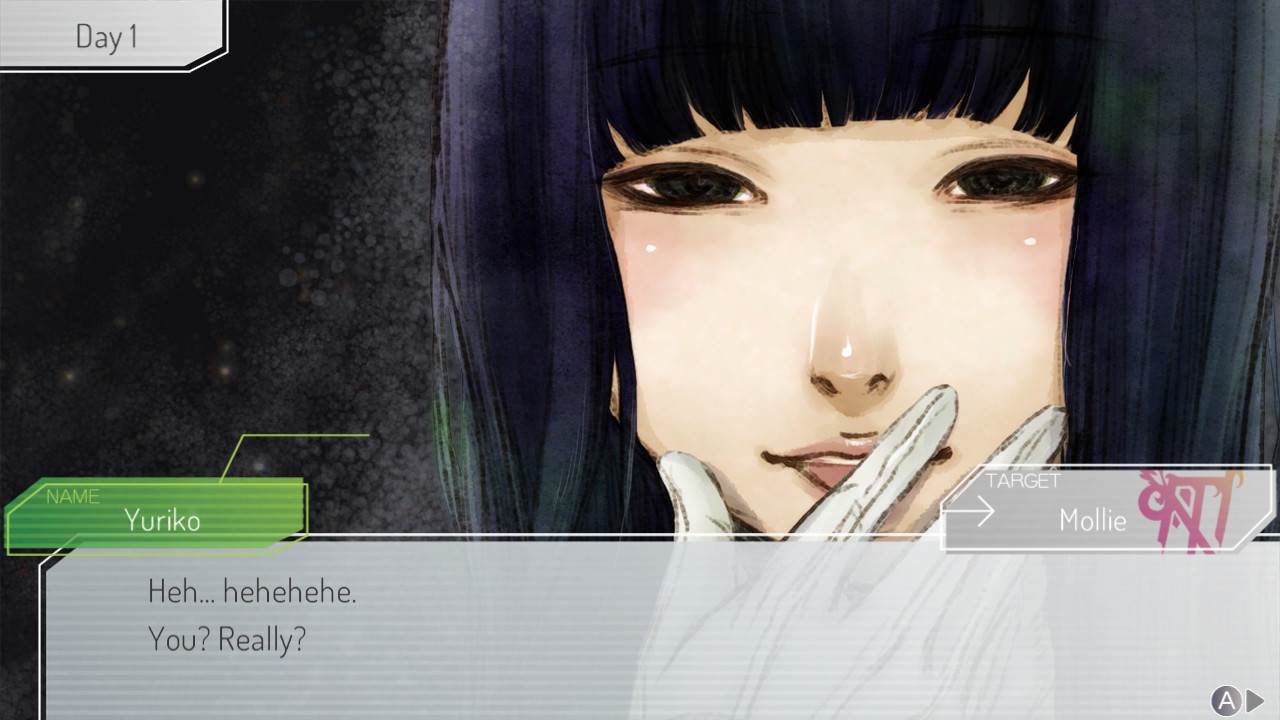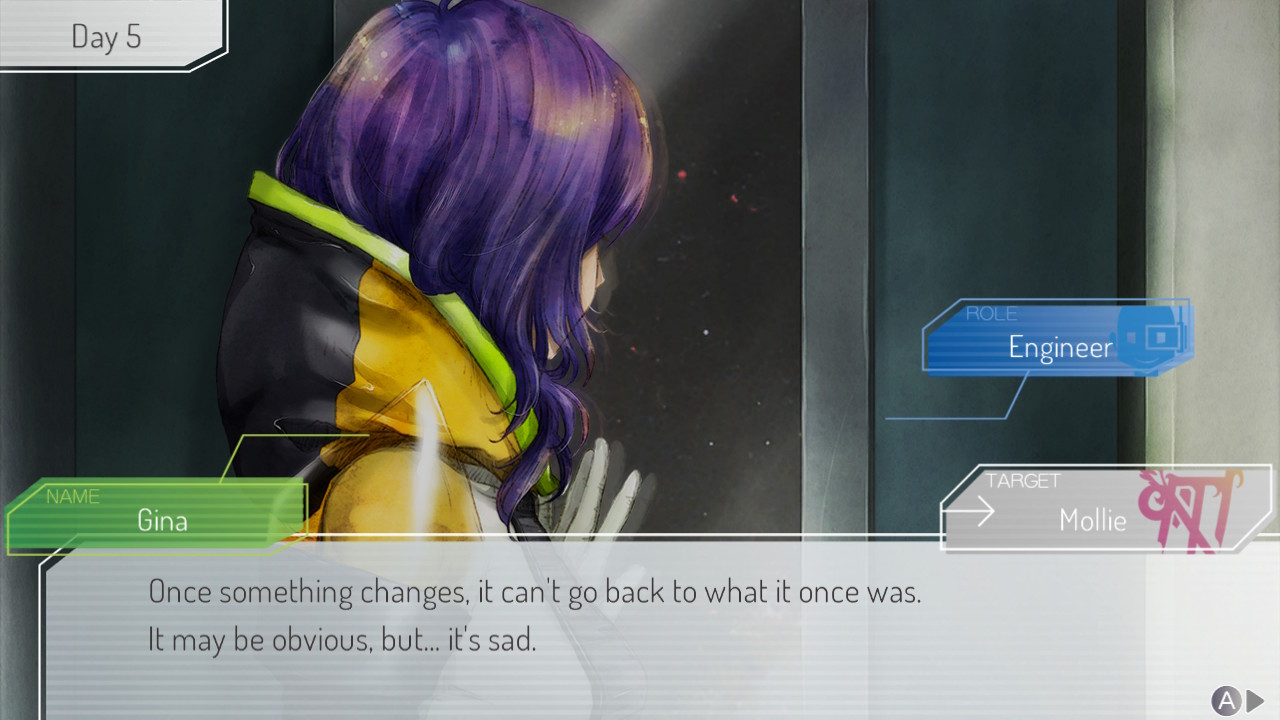Gnosia Review
When discussing video games, making some amount of comparisons is unavoidable. While it can get complicated to explain all of the intricacies of any particular game, if I instead tell you it’s a “Souls-like,” a “Metroidvania,” or “like MLB The Show and Robot Wars had a baby,” you’re likely to get a general idea of the experience.
However, there’s one comparison making the rounds as of late that’s gotten under my skin: explaining Petit Depotto’s graphical adventure Gnosia by referencing Among Us. I’ve seen both players and media make the connection countless times now, and while I know it shouldn’t bug me, it gives credit to a game that’s far from having created the style of experience in question.
Sure, Among Us did beat Gnosia to release by a year or so, but both take inspiration from Mafia/Werewolf, a social game created by Dimitri Davidoff back in 1986. Its premise is simple: A group of people is infiltrated by a smaller group of “others” who mean the majority harm, and it’s the job of the innocents to deduce who those threats are and deal with them. Of course, in terms of general storytelling, Davidoff based his game on even older ideas of hidden threats lurking amongst the unaware. While my coworkers have stressed that I mention movies like Invasion of the Body Snatchersand The Thing, one of the earliest examples in media I personally remember encountering was the 1996 localization of They Were Eleven. A Japanese science fiction manga series from 1975, They Were Eleven tells the story of 10 young space cadets who must survive a final test aboard a decommissioned spacecraft. The problem is, when they wake up aboard the ship, there are now 11 members instead of ten, and none of them are able to initially recognize who the imposter is.
I bring They Were Eleven up because Gnosia showcases more than a few similarities to Moto Hagio’s classic manga. When the game begins, you’re given no tutorial, no explanation of what’s going on, nor any real introduction to your current situation and its participants. All you know is that you’re suddenly woken up from cryosleep aboard some sort of spacecraft, and told that there’s an alien lifeform called Gnosia on the ship that means to do everyone harm. Identifying the imposter is an incredibly difficult task, given your lack of any real knowledge both in-game and as a player, and there’s no precedent set yet for how exactly you go about figuring out who is Gnosia and who isn’t.
The thing is, you aren’t really supposed to properly deal with the Gnosia in your first encounter with them—nor your second, nor third, nor fourth. In addition to the overarching Werewolf-based gameplay, Gnosia adds the twist of being stuck in some sort of time loop. No matter the outcome of your first steps into the game’s world, everything ends up resetting, starting you off again in a fresh loop. There, you get another shot at weeding out the Gnosia, putting them into cold storage so they can’t kill anyone, and keeping the rest of the crew safe.
Except—it quickly becomes clear that what’s going on isn’t actually a repetition of the same moment in time. On your second loop, there’s suddenly a new crew member who didn’t exist before. The person who was Gnosia is now just a regular human. The events that played out previously no longer occur. The next loop, things shift again. The roster changes. Friends are no longer friends, enemies no longer enemies. New details and options for discovering who is a threat become available. This happens over numerous loops until all of Gnosia’s core mechanics fall into place, and serve as an initially confusing, but quickly compelling introduction to what awaits in the rest of the game.
Soon, the game settles into a proper rhythm. Every loop plays out across a series of days, during each of which you’ll need to put someone into cold sleep. Digging deeper into who may be the enemy plays out through visual novel-esque conversations, where both you and the NPC crew members can suggest someone seems suspicious, throw your support behind another person’s opinions, or use a variety of other unlockable tactics to shift the discussion in various directions. One of Gnosia’s most impressive aspects is just how dynamic and unscripted these meetings between the crew can feel. While there’s only a set amount of dialog crafted for the game—meaning you’ll see the same statements of innocence, accusation, or otherwise over and over—the path to deciding who’s next for cold sleep never feels pre-determined. While some problems with this core mechanic crop up that I’ll get to shortly, there’s a genuine sense of excitement that grows from never knowing when your well-laid plans may take a right turn at a moment’s notice.
Complicating things even further is that not only are the number and identity of the Gnosia in each loop random, but so are the roles the other crew members hold. The first introduced is the Engineer, who can, at the end of each day, scan one other person to determine if they’re human or alien. That’s followed by the Doctor, who can answer the same question for the member who went into cold sleep the previous day; two people assigned Guard Duty, which story-wise means they can’t be anything but human; the Guardian Angel, who can protect one member of the crew from dying per night; the AC Follower, a normal human who will lie to support the Gnosia; and the Bug, a glitch in the fabric of the universe that will kill everyone, human or otherwise, if they’re left alive at the end of a loop.
While each of those roles work to help or hinder the search for Gnosia, the twist is that any crew member—including yourself—can lie about being an Engineer or Doctor. As the game progresses, it’s not uncommon to have two or even three different people claiming to be either of those roles, making the information they provide potentially useless (or even harmful) until it’s determined who is lying. Between the ways you can shift conversations and the impact those roles can have on allegiances, Gnosia’s debates can become incredibly complex on a gameplay level, especially given the fact that you’re the only actual human playing the game—as opposed to completely human-driven social games such as Among Us.
Once a final vote is cast and someone is sent to cold sleep, you’re given the ability to level up your personal stats, and then talk to one of the remaining crew members if you’d like. At the end of each loop, you’ll gain XP depending on how successful that loop was, and boosting your stats improves your ability to do things like detect lies, convince the others to trust you, or not seem suspicious in those loops where you yourself are Gnosia. Meanwhile, talking to crew members is where the bulk of the narrative moments take place. While generally meeting up with others will just result in a quick throw-away line of dialog, key events will unlock depending on how the current loop is progressing. These can be everything from another crew member asking for your help in convincing the others to vote for someone specific, unlocking more of the backstory of those you’re stuck on the ship with, or even fulfilling certain requirements for moving the main story along.
As a concept, and in terms of its core gameplay, Gnosia is a fascinating game, one that presents situations and narrative possibilities I’ve not really encountered before in many of its peers. At the same time, it’s also a frustrating game. While how long it’ll take to beat depends on how well you play and how quickly you can accomplish certain goals, getting through Gnosia will easily require between 100 to 150 loops, with each lasting anywhere from 5 to 15 minutes. In the first 10 loops, I was finding the game absolutely enthralling, but as I hit 30, it was feeling like the game’s wheels were just spinning without going anywhere. Soon after that point, however, I opened up the ability to configure each individual loop, from how many humans and Gnosia there’d be, to if roles like the Doctor and Guardian Angel were present or not, to specifying my specific role (including Gnosia and Bug). That definitely helped freshen things up, and gave me the chance to experience loop types I’d seen less of up until that point.
It was even further into the game, though, when the most important option finally unlocked. At that point, I gained the ability to shuffle the loop settings to specifically search for points of progression I hadn’t found yet. In order to beat the game, there’s a long list of “right place at the right time” loops you’ll need to hit, which depend on anything from who specifically is Gnosia, to who lasts through until the end of the loop, to who you team up with, and so on. The problem is, knowing what to do and actually being able to do it are two different things. There were times when, for example, I had to protect a specific crew member from getting taken out early, but it was incredibly difficult because they were someone who was already disliked by a lot of the rest of the crew.
Gnosia’s AI logic for determining who each member will vote for doesn’t feel like just a simple set of logic equations, which I appreciate, but it also doesn’t always feel logical either. As one example, I was playing a loop where the group realized I was the true Engineer, and I found out that one of the crew was Gnosia. The next day, I outed them, and the Doctor (who was also confirmed to be legit) agreed with my assessment. And yet, I was still accused of being suspicious and voted out. Sometimes, decisions the NPCs make will feel like shrewd tactics to get someone to overplay their hand and expose themselves, but at other times, they’ll just feel like chaos devoid of any basis in logic. This can make those loops where you’re trying to protect someone incredibly difficult, and I sometimes found myself just mashing buttons to get a loop over with when I’d realized I’d failed the entire purpose of said loop. Early on, Gnosia can feel tedious because nothing is happening; later, it can feel that way because the game seems determined to foil your plans.
I genuinely try not to play “armchair game developer” whenever doing reviews, but it’s hard for me not to believe Gnosia would have been a better game had it focused on far fewer but more important loops. Even in those times when you’re working toward a certain goal, when you’ve got 100-plus loops, each of which may have up to four or five voting sessions, it can be easy to just not care if you get the less important rounds right. I especially wish Petit Depotto had given Gnosia a tighter focus because the cast is just so utterly enjoyable. Every crew member brings something worthwhile to the story while simultaneously oozing character, even those that you’re sure you’re going to hate in the early going. The game is absolutely at its strongest in those loops when the story shines through, and even though I know I’ve run into a lot of the same story beats countless times before, there’s still something special about how they all come together here. Part of what gives Gnosia its charm is its art style, whose qualities reflect the game as a whole: rough and at times amateurish, yet also beautiful and full of personality.
In nearly every case, I’ll always prefer when a game tries something daring and then botches its execution, rather than having it end up polished and perfected yet taking no risks. Gnosia is a total mess at times, and could absolutely have benefited from more refinement and tightening of its core ideas and storytelling style. And yet, it is a game that simultaneously feels so different than most everything else out there. Even while I was cursing at the game’s AI or bitching about how many loops I had to play, I never stopped wanting to push forward to see what was next. It wasn’t that long ago that Western publishers would have passed Gnosia up for localization due to being too weird or niche, so I’m glad we now live in a world where it can get a proper chance—even if there were times when I wanted to toss it into cold sleep for its crimes.
Gnosia
Summary: Gnosia takes the classic social game of Werewolf and transforms it into a single-player graphical adventure experience. Arguing against the computer in an attempt to determine who is the human-killing alien in your group is far more dynamic and exciting than you’d ever expect this type of game to be. Unfortunately, its compelling gameplay gets tarnished somewhat by the requirement to go through those searches so many times that their charm can wear off. Still, Gnosia’s engrossing story and fantastic cast of characters make the game’s duller moments worth getting through in the end.
Score: -
Gnosia was reviewed using review code, physical copies, or hardware provided by Playism. Scores are graded on a scale of E (Bad) to S (Special) in homage to Japanese video game grading scales, with the understanding that an S still does not denote a "perfect" score. Scores may have been adjusted from the original source to better fit my personal scale.





